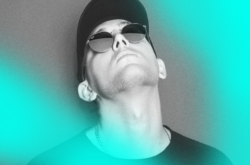Mick Schultz is a multi-platinum producer and songwriter with credits on a diverse catalog of hits.
Some of the tracks he produced include “Birthday Sex,” “Down On Me,” and “Don’t Tell ‘Em” by Jeremih, “Desperado” by Rihanna, and crossover records including “Replay” by Zendaya and “Heat” by Kelly Clarkson. His recently-released sample pack reflects his diverse palette, featuring hard-hitting drums, dirty FX, and versatile vocals that are perfect for both polished pop and gritty experimental production. Watch him discuss the pack below, and then read on to learn about his creative process.
To start, tell us a bit about your story as a producer – how did you start making beats?
I really fell in love with music, specifically production, when I was around 11 years old. I was obsessed with the mix show on the radio so much so that I ended up getting turntables and buying vinyl so that I could mix records together on my own. Doing that made me realize that I didn’t want to just play music – I wanted to create it.
I got my first drum machine when I was around 12 years old, and after that a Korg Triton, which at that time was pretty much the best gift ever. I would sequence and make all my beats inside the Triton keyboard. I eventually got a copy of Pro Tools so that I could record vocals and put a full song together. I would spend every day that I could all throughout high school trying to perfect my craft – recording anyone that I could, making mixes to play at parties, etc., constantly trying to make each beat or song better than the one before. By the time I turned 18 and moved to Chicago to attend Columbia University, music had consumed every ounce of my life in the best possible way, and that’s when things really started to change in a way I had only dreamed about.
You’ve worked closely with Jeremih on his first three albums that received great success. How did you first meet, and why do you think you work so well together?
I met Jeremih in Chicago – we were both attending Columbia at the time, and I was working with a few other students making music at my “studio” (which was really just the living room of my apartment). Jeremih came through one day, and the chemistry just flowed so naturally, and we both loved the music and shared the same passion for it that we began working together as often as we could.
I think we balance each other out well, in the sense that even though our approaches to music were a bit different, that’s what ultimately helped push the creativity forward. The first song we officially released was called “Birthday Sex,” which hit #1 on Billboard. After that we didn’t change anything in the studio; we just kept making records and doing what felt good to us, which is why I think the success continued.
What DAW do you use? Is there any particular production hardware or software in your producer toolkit that you can’t live without?
I work in Pro Tools. A lot of people are surprised when they see I produce in Pro Tools, but it’s not really about the DAW you’re using. It’s about who is using it and how it’s being used. I know it like the back of my hand, and I don’t just use it to make beats – I engineer, mix, record vocals, and do pretty much everything else that it takes to get a song from start to finish, so Pro Tools for me is great for that.
It’s hard to say what I couldn’t live without because I’m always looking to start songs in new ways, using different gear and approaches to produce a track. Of course Pro Tools is a big one for me, but I would say Kontakt 6 because all the samples I make go through it. I make a lot of custom drum kits, and those are set up in Kontakt files so I can map them on the keyboard. I also probably couldn’t live without FabFilter’s Pro-Q, since I use that on every record I do.
You’re a classically trained pianist as well as a DJ since you were in grade school. How has your musical pursuits from your early years influenced your sound and production today?
Studying piano early on, and even more so music theory, really opened up my mind to songwriting and helps keep my ideas fresh. Similar to how getting new sounds can inspire a beat, studying theory inspires the structure and melodic elements.
Some of your projects (for example “Paradise” on Jeremih’s Late Nights: The Album) sample strings, guitar, and other sounds that can be unique for a R&B album. When making a beat, how do you decide what to sample? Do you have any favorite approaches to manipulating or chopping up your samples?
With “Paradise,” I actually didn’t sample anything in that song. I wrote the whole song from scratch on guitar and then played it out on the keys. We recorded that track to just the guitar, and then the the strings were added later on.
When it comes to samples, my favorite thing to do is sample myself. I’ll play something out on the guitar or a keyboard and then chop it up in Pro Tools or Kontakt and find ways to manipulate it into something new. I love processing sounds to get something completely different than what I started with. Sometimes it’s great to distort and pitch something completely random without a real vision, because you get a sound that you could have never thought of.
You’ve worked with very large acts, including Jeremih, Rihanna, Ludacris, 50 Cent, Zendaya, and Kelly Clarkson (to name a few). How do you decide what the sound is for a particular artist, and does your process differ depending on who you’re working with? Do you have any new, notable collaborations underway in the new year?
My goal with any artist or group is to always bring their vision to life and bring something new to the table for them. In some situations, I’ll bring in ideas that I feel could be great foundations to build on. Other times, especially if I’m spending a lot of time with the artist working from scratch, I’ll build the production around the song that we write. In those situations, I like to let the vocals and melody lead the way for what the production could do.
I’m working on several projects with Atlantic Records right now that you’ll be hearing about soon.
Lastly, can you share three tips for new and aspiring producers?
Sound design: When it comes to sound and being unique, I think one of the best ways to define who you are is to literally just create your own sound. I’m not saying you have to be a synthesis master or sound design pro. You can simply take a snare drum you already have or go onto Splice and download a few drum sounds – pitch and warp them a bit with distortion and other effects, and then immediately you’ll have something that’s unique to you. It’s a great way to find new inspiration, and you’ll find it’s really satisfying to come up with a sound that literally didn’t exist a few minutes before.
Network and collaborate: It’s great to work on your own, but when you work with others you share ideas and knowledge. You pick up other people’s processes and approaches to making music, and that can inspire you to grow in new ways that a YouTube video can’t offer. On top of that, you build relationships, which is (aside from the music itself) the most important tool you can have in the music industry.
Learn the gear you have: Try not to get too distracted with all the new gear and plugins dropping literally every week in today’s world. Focus on the things you currently own and master them. Chances are you haven’t even scratched the surface on what some of the tools you already have can do. It’s amazing how creative I can be when I focus in on just a few things to produce with and really use them to their full potential. It’s great to have options, but limiting yourself can make you be more creative. It forces you to figure out how to manipulate that one plugin or synthesizer to make something that’s your own.
Check out Mick Schultz’ “Paragon Kit Vol. 1” here.
March 15, 2019



